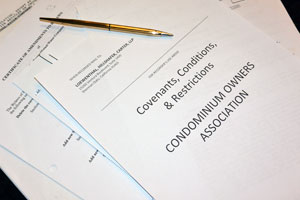LHC Newsletter Vol. 10, No. 1
“THE CC&R AMENDMENT DID NOT PASS, WHAT NOW?”
By: Robert D. Hillshafer, Esq. and Michael D. Attar, Esq.
Virtually every Association suffers from apathy and/or indecision when it comes to voting on a proposed restatement or amendment to Covenants, Conditions and Restrictions (CC&Rs). This apathy persists even when multiple attempts at soliciting membership vote have been made and voting periods have been extended. Since most CC&Rs require a supermajority of 67% or 75% to pass an amendment of the CC&Rs the will of a substantial majority of the voting membership can effectively be ignored because of the mere lack of participation by a small number of members. This can make it very difficult, if not impossible, to effectuate important and necessary changes to the CC&Rs as a non-vote essentially becomes a no vote. This result is both frustrating and detrimental to the Association and its membership on multiple levels. The Association will have already invested thousands of dollars in legal fees and costs to have the amendment drafted as well as expended time and effort attempting to educate the members and encourage them to vote.
Fortunately, there is a Court Petition procedure which is designed specifically to mitigate against the lack of participation and allow Associations the ability to pass important amendments to the CC&Rs through court intervention when at least a majority of the members have approved an amendment even though attempts at obtaining approval by a supermajority requirement have failed. The petition to be filed with the Superior Court is entitled: Petition To Reduce Required Percentage To Amend Declaration.
Civil Code 4275 (formerly Civil Code 1356) provides an Association with a viable alternative process, through a Court Petition. In order to qualify to seek relief under the Petition process, the statute requires that at least 50 percent of the membership in the Association voted in favor of the amendment. Although not explicitly indicated in the statute, experience with the process indicates that the higher the percentage of affirmative votes the better chance the Court will reduce the necessary percentage and approve the amendment based on the actual percentage obtained.
To qualify for the Petition process, balloting on the proposed amendment must have been conducted in accordance with the governing documents, the Davis-Stirling Act, and any other applicable law. As such, the Association must comply with the secret ballot requirement by using the two envelope system as reflected in Civil Code 5115. Further, the Association must factually establish that a reasonably diligent effort was made to permit all eligible members to vote on the proposed amendment. This means that sufficient time, i.e. at least thirty (30) days to vote on an amendment and reminding and encouraging members, by posting notices, email blasts, and other means of providing notice to the membership, in an effort to provide an opportunity for members to exercise their right to vote. It is always good practice to contemplate the need to use the Petition Process at the outset of the amendment process so that evidence is available to demonstrate that the criteria in the statute have been met.
Assuming the foregoing criteria is met, and the amendment is reasonable and not sought for an improper purpose, the Association may file a Petition in the Superior Court of the county in which the Association is located for an order reducing the percentage of the affirmative votes necessary for such an amendment. Although the statute does not require the petition to be verified or in the form of a Declaration, it is our experience that a board member should verify the Petition. Some Courts have required a Declaration under penalty of perjury be submitted by a board member to establish the necessary factual elements and authenticate the relevant and necessary evidence supporting the Petition.
The statute spells out the procedural requirements for the petition which includes:
- Describing the efforts that have been made to solicit approval of the Association members in the manner provided in the Declaration;
- The number of affirmative and negative votes actually received;
- The number or percentage of affirmative votes required to effect the amendment in accordance with the existing Declaration;
- Other matters the petitioner considers relevant to the Court’s determination.
Moreover, the petition must contain, as exhibits to the Petition, copies of all of the following: (1) The governing documents (CC&Rs, Bylaws, Condominium Plan and Articles of Incorporation). (2) A complete text of the amendment voted upon. (3) Copies of any notice and solicitation materials utilized in the solicitation of member approvals. (4) A short explanation of the reason for the amendment. (5) Any other documentation relevant to the court’s determination.
Ultimately, the Court has complete discretion to approve or deny the Petition. The statute provides that “The court may, but shall not be required to, grant the petition…” The procedures and process involved in the process include several court hearings, including an ex parte application to set the hearing, and the actual Petition hearing itself. The Association must provide at least fifteen (15) days written notice of the Court hearing to all members of the association in a form dictated by the Court. Obviously, this can be a costly mailing to the members, particularly with the Petition and the exhibits typically being a hundred or more pages. Our approach has been to convince the court at the ex parte hearing to minimize the expenses through several more cost efficient means of providing notice to the membership such as providing the membership notice of the applicable court dates including Petition hearing date and making the Petition available at the managing agent’s office or by electronic copies.
The Petition may be opposed by members of the Association or by mortgagees (lenders) although this is relatively infrequent. Written oppositions, Declarations and other evidence must be submitted as to the factual components relating to issues of improper voting/balloting, reasonable diligence in permitting eligible voters an opportunity to vote, and legal arguments concerning the reasonableness of the amendment. If opposed, the Petition hearing is effectively a bench trial with the court entering a judgment. This may require additional briefing of legal issues, submission of additional declarations in support of factual matters, both of which add to the expense of the process overall. The Petition process is not part of the legal fees to produce the amendment. Again, the granting of the Petition is discretionary with the Court so it is important that the amendment be objectively reasonable. If the Petition is granted, it will indicate that the amendment is not effective until the Court order and a Certificate of Amendment duly notarized by a board member is recorded in the County Recorder’s Office. The amendment carries the same force and effect as if the amendment were adopted in compliance with every requirement imposed by the governing documents. The final component is that within a reasonable time after recording, the Association shall deliver a copy of the amendment together with a statement that the amendment was recorded to the members.
Because the Petition can be opposed by members it is important to realize that Attorney fees are not available to either a successful Petitioner Association or to a successful opposing member/owner of the Association. By definition, the Petition process is not an enforcement action pursuant to Civil Code Section 5975 relating to the enforcement or to restrain the violation of the Declaration. In the case of Blue Lagoon Community Association v. Mitchell (1997) 55 Cal.App.4th 472, the court addressed the exact issue of the availability of attorney fees for a successful respondent in a petition under former Civil Code section 1356, finding no basis for an award of attorney fees under then Civil Code Section 1354. Indeed, the court recognized that allowing the prevailing party to recover attorney fees would have a chilling effect on the process itself as owners with a legitimate opposition to the process would be afraid to present opposition if they could be responsible for the Association’s attorney fees. It would also potentially hinder Board’s in making the decision to seek court approval if it would be liable for attorneys fees if the Petition was denied.
Unlike many provisions enacted by the legislature, the Petition process in Civil Code Section 4275 has a completely salutary impact that benefits both Associations and members and provides an absolutely critical vehicle to allow a majority of members to overcome lack of participation in the amendment process when it can show that the amendment is reasonable and all members had an opportunity to participate.


